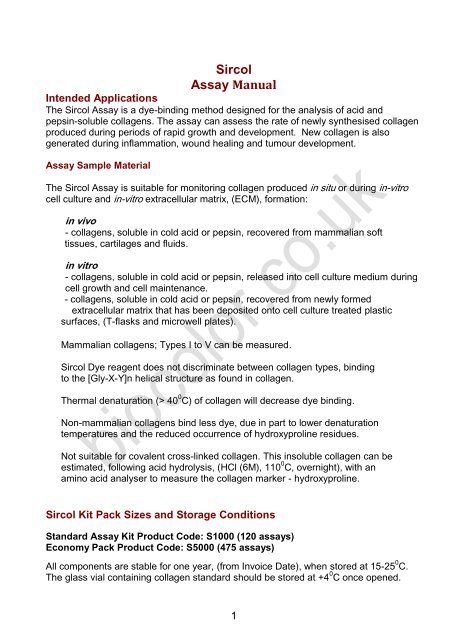Sircol Assay Manual - Biocolor Assays
Sircol Assay Manual - Biocolor Assays
Sircol Assay Manual - Biocolor Assays
Create successful ePaper yourself
Turn your PDF publications into a flip-book with our unique Google optimized e-Paper software.
<strong>Sircol</strong><br />
<strong>Assay</strong> <strong>Manual</strong><br />
Intended Applications<br />
The <strong>Sircol</strong> <strong>Assay</strong> is a dye-binding method designed for the analysis of acid and<br />
pepsin-soluble collagens. The assay can assess the rate of newly synthesised collagen<br />
produced during periods of rapid growth and development. New collagen is also<br />
generated during inflammation, wound healing and tumour development.<br />
<strong>Assay</strong> Sample Material<br />
The <strong>Sircol</strong> <strong>Assay</strong> is suitable for monitoring collagen produced in situ or during in-vitro<br />
cell culture and in-vitro extracellular matrix, (ECM), formation:<br />
in vivo<br />
- collagens, soluble in cold acid or pepsin, recovered from mammalian soft<br />
tissues, cartilages and fluids.<br />
in vitro<br />
- collagens, soluble in cold acid or pepsin, released into cell culture medium during<br />
cell growth and cell maintenance.<br />
- collagens, soluble in cold acid or pepsin, recovered from newly formed<br />
extracellular matrix that has been deposited onto cell culture treated plastic<br />
surfaces, (T-flasks and microwell plates).<br />
Mammalian collagens; Types I to V can be measured.<br />
<strong>Sircol</strong> Dye reagent does not discriminate between collagen types, binding<br />
to the [Gly-X-Y]n helical structure as found in collagen.<br />
Thermal denaturation (> 40 0 C) of collagen will decrease dye binding.<br />
Non-mammalian collagens bind less dye, due in part to lower denaturation<br />
temperatures and the reduced occurrence of hydroxyproline residues.<br />
Not suitable for covalent cross-linked collagen. This insoluble collagen can be<br />
estimated, following acid hydrolysis, (HCl (6M), 110 0 C, overnight), with an<br />
amino acid analyser to measure the collagen marker - hydroxyproline.<br />
<strong>Sircol</strong> Kit Pack Sizes and Storage Conditions<br />
Standard <strong>Assay</strong> Kit Product Code: S1000 (120 assays)<br />
Economy Pack Product Code: S5000 (475 assays)<br />
All components are stable for one year, (from Invoice Date), when stored at 15-25 0 C.<br />
The glass vial containing collagen standard should be stored at +4 0 C once opened.<br />
1


